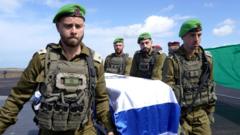As the conflict subsides, the personal toll on Gazans is palpable, with thousands still unaccounted for and the search for the missing becoming a painful reality for many families.
### Searching the Ruins of Gaza: Families Confront New Trauma

### Searching the Ruins of Gaza: Families Confront New Trauma
With a recent cease-fire in Gaza, countless families face the daunting task of uncovering the remains of their loved ones buried in the rubble.
In the aftermath of the 15-month war between Israel and Hamas, Gazans are grappling with the emotional aftermath of war as they search for missing loved ones amid the rubble left behind. Hani al-Dibs, a high-school teacher, reflects on his family's loss and the grim memories that haunt him as he tries to continue his life after the devastation.
The recent cease-fire, having halted the bombings that plagued the region, should ideally signify hope for peace; however, for many, it has only intensified feelings of dread. Al-Dibs, along with his two surviving children, prepares to return to their hometown of Jabaliya, where they hope to uncover the bodies of their family members believed to be trapped beneath the debris of their demolished home.
“Their questions torment me,” Al-Dibs says, revealing the struggle of his children as they grapple with uncertainty about the fate of their mother and brothers. The haunting possibilities of survival—“What if they were still sleeping after the explosion?”—linger heavily for many families.
Gazan health authorities report nearly 48,000 dead due to the conflict without differentiating between civilians and combatants. The stark reality of their situation has led some families to encounter the remains of loved ones in conditions so dire that identification has become nearly impossible. Others face the overwhelming stench of decay that prevents them from accessing the chaos that was once their home.
This ongoing tragedy emphasizes the need for humanitarian support and understanding as families strive to cope with the emotional burden of loss, in the wake of a conflict that leaves both physical and emotional scars.
The recent cease-fire, having halted the bombings that plagued the region, should ideally signify hope for peace; however, for many, it has only intensified feelings of dread. Al-Dibs, along with his two surviving children, prepares to return to their hometown of Jabaliya, where they hope to uncover the bodies of their family members believed to be trapped beneath the debris of their demolished home.
“Their questions torment me,” Al-Dibs says, revealing the struggle of his children as they grapple with uncertainty about the fate of their mother and brothers. The haunting possibilities of survival—“What if they were still sleeping after the explosion?”—linger heavily for many families.
Gazan health authorities report nearly 48,000 dead due to the conflict without differentiating between civilians and combatants. The stark reality of their situation has led some families to encounter the remains of loved ones in conditions so dire that identification has become nearly impossible. Others face the overwhelming stench of decay that prevents them from accessing the chaos that was once their home.
This ongoing tragedy emphasizes the need for humanitarian support and understanding as families strive to cope with the emotional burden of loss, in the wake of a conflict that leaves both physical and emotional scars.




















